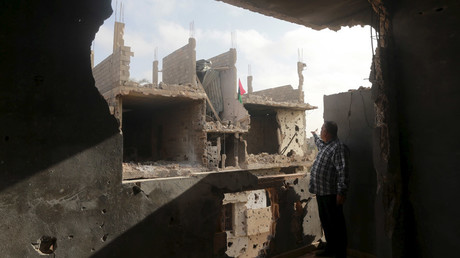Chip off the old block: Trump’s threats at UNGA echo those of his predecessors
Words of a US president should not be taken lightly, as they can be followed by actions that have far-reaching consequences, as did Barack Obama’s declarations on Libya and Syria, and George W. Bush’s famous speech on the ‘Axis of Evil.’
Having called North Korean leader Kim Jong-un “Rocket man on a suicide mission,” US President Donald Trump told the UN General Assembly on Tuesday that the United States may have no choice but to “totally destroy” North Korea, if it attacks the US or its allies.
To Iran Trump had this message: “We cannot let a murderous regime continue these destabilizing activities,” he said, citing Tehran’s support for Hezbollah, the Syrian government, as well as for Shia Houthis in the Yemeni civil war.
Trump also called for the “full restoration of democracy and political freedoms in Venezuela,” saying the US will do everything to help the people of that country “regain their freedom, recover their country, and restore their democracy.”
The world has yet to see what actions will follow President Trump’s statements. However, the consequences of his predecessors’ statements have already been experienced.
Gadaffi and Assad ‘must go’ - Obama
In March 2011, President Barack Obama said Libyan leader Colonel Muammar Gaddafi must “step down from power and leave” immediately, after Gaddafi threatened to crack down on rebels in Benghazi.
With the UN Security Council resolution giving NATO a mandate to establish a no-fly zone to protect Libyan civilians, the US took a step further and helped kill Gaddafi. Several months later, Obama reported success at the UN General Assembly.
“Forty-two years of tyranny was ended in six months. From Tripoli to Misurata to Benghazi -- today, Libya is free.” However, Libya plunged into chaos for years to come, as rival tribes and factions fought each other and terrorists gained foothold. In 2016, Obama called the failure to plan for the aftermath of Gaddafi’s removal in Libya the biggest mistake of his presidency.
Addressing the UN General Assembly in 2012, Obama said “the regime of Bashar Assad [in Syria] must come to an end.” Obama administration officials have since stressed the position many times, while throwing Washington’s support behind rebels fighting the Syrian government.
Extremist factions became a dominant force among rebels and the Obama administration repeatedly failed to separate so-called moderate opposition from terrorist groups, despite many pledges to do so. During his presidency, the Islamic State terrorist group (also known as ISIS/ISIL) grew to seize vast swaths of territory in Syria and Iraq.
‘Axis of evil’ - Bush
In his 2002 State of the Union speech, George W. Bush said North Korea, Iran and Iraq constituted “an axis of evil, arming to threaten the peace of the world.”
“Some of these regimes have been pretty quiet since September 11, but we know their true nature,” Bush said, referring to the 2001 terrorist attacks against the United States a year earlier.
Shortly after the speech, the US invaded Iraq, claiming it had weapons of mass destruction. None were ever found. Nearly half a million Iraqis died in the war that followed the invasion, according to a 2013 study.
North Korea, which had suspended its nuclear program in the 1990’s in exchange for international aid, restarted it with new vigor. Iran took notice too, planning for its defense against a potential US attack.
Bush’s invasion of Iraq and the sectarian war that followed gave rise to Al-Qaeda in Iraq, which in 2014 declared itself as Islamic State.



